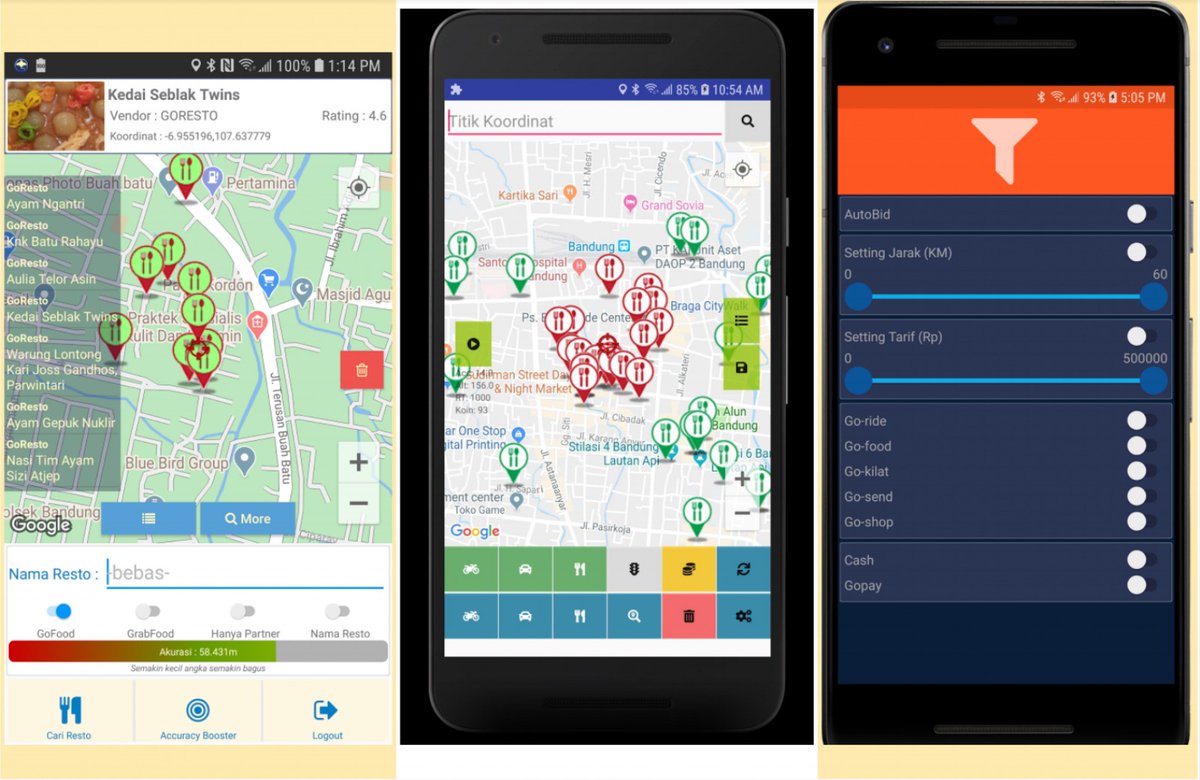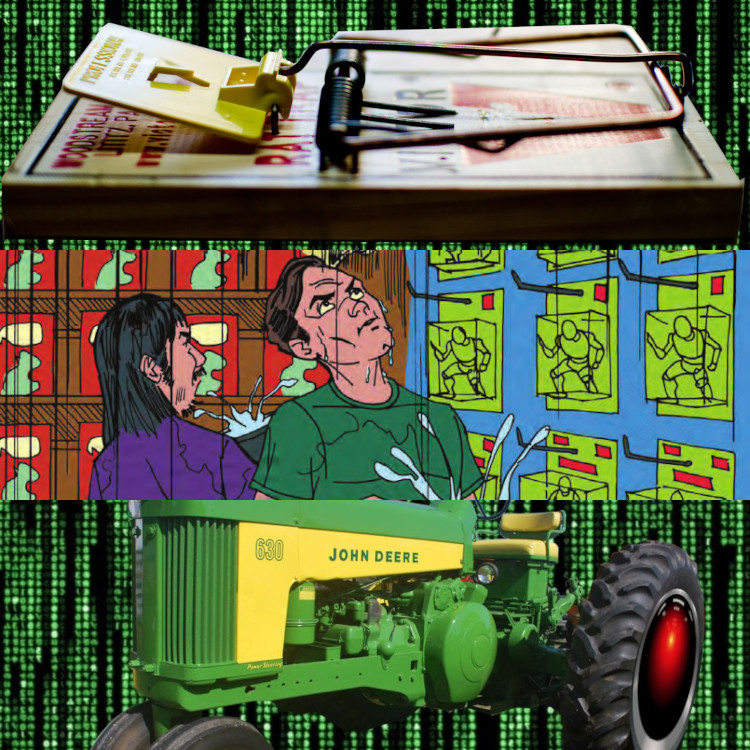
Gojek is a $10B Indonesian "super app" that combines "Postmates, Apple Pay, Venmo, and Uber" serviced by an army of ojol - drivers - who are subjected to all the high-handed algorithmic horrors that gig workers everywhere suffer through.
vice.com/en/article/7kv…
1/
vice.com/en/article/7kv…
1/

But Indonesian ojol aren't helpless before their apps; a legion of toolsmiths produce, share, sell and support "#tuyul apps" named for "a child-like spirit in Indonesian folklore that helps his human master earn money by stealing," which modify the Gojek app.
2/
2/
As part of her MIT PhD, @qadrida studied Gojek, ojol and tuyul apps, and her account of the grey-market Gojek ecosystem for @motherboard is riveting.
vice.com/en/article/7kv…
3/
vice.com/en/article/7kv…
3/
Tuyul apps are wildly innovative and diverse, from tools to magnify text so older ojol drivers who can read the tiny default app's text, to filters that allow drivers and riders to preview jobs, avoiding the algorithmic penalty for turning down a job after accepting it.
4/
4/
Indeed, many tuyul apps are tools that permit workers to resist their algorithmic employer's "optimizations," which inevitably "optimize" the work so as much value as possible is transferred from the workers to their bosses.
5/
5/
Take GPS-spoofing. Gojek's corporate overlords have decreed that drivers have to be close to a pickup to be eligible to get the job. On its face, this sounds reasonable, but in practice, it creates massive jams around train stations where unsheltered riders wait in the rain.
6/
6/
Gojek created a situation that has clogged the roads around stations, creating traffic hazards and introducing delays into deliveries. Riders are on site and better equipped to decide how to do their job than a distant, unaccountable product manager.
7/
7/
Riders use GPS spoofers to trick the app into thinking they're onsite when really they're waiting at a sensible distance.
Tuyul app creators are drivers with tech knowhow, who fell into the work as part of mutual aid networks.
8/
Tuyul app creators are drivers with tech knowhow, who fell into the work as part of mutual aid networks.
8/
Over time, this has matured into IT Jalanan -"IT of the Road" - a full-service, somewhat ad-hoc tech support network of IT specialists who build, service and use apps that make gig workers' lives better.
9/
9/
They have extensive documentation for users on how to root their phones and side-load the third party apps. Apps are sold and supported through Whatsapp and other platforms, along with service and support packages.
10/
10/
Crucially, the support for tuyul apps is much better than the support Gojek offers to gig workers when they struggle with the bugs in its app - making downloading a third-party mod a faster and better experience than trying to get Gojek to fix its shit.
11/
11/
Not all tuyul apps are benign. Some are scams that rip off drivers, other are scams that help drivers rip off Gojek. @GojekOnTwitt, a driver community organized against being made "a slave of the algorithm," has a mixed position on tuyul apps.
12/
12/
One of GOT's founders has proposed that the GPS spoofing be integrated into Gojek's official app, allowing users to place their pin within 1km of their actual location.
13/
13/
All of this is a powerful lesson in the importance of #AdversarialInteroperability (AKA #CompetitiveCompatibility/#comcom), the practice of modifying an existing technology against the wishes (or without permission) of its maker.
eff.org/deeplinks/2019…
14/
eff.org/deeplinks/2019…
14/
Comcom allows the users of technology to override its designers' choices based on their local, up-to-the-minute knowledge of their circumstances, like overriding your car's mandatory software update when you're trying to escape a wildfire.
locusmag.com/2021/07/cory-d…
15/
locusmag.com/2021/07/cory-d…
15/
The point of interop isn't "competition" or even "efficiency" - it's technological self-determination, the right to decide how you live your life. This DOES lead to competitiveness and autonomous workers ARE more efficient than drones, but that's not the point.
16/
16/
Companies like Gojek lump all mods into the same basket - mods that let drivers do their job better and mods that enable fraud. From Gojek's perspective, anything that frustrates their shareholders is bad news - it's all "felony contempt of business model."
17/
17/
That's why laws, not corporate decree, should determine what kind of interoperability we permit and which ones we don't. Our current laws (in the US, Sec 1201 of DMCA, CFAA, etc) simply say, "If the manufacturer says no, it's not allowed."
gizmodo.com/in-2030-you-wo…
18/
gizmodo.com/in-2030-you-wo…
18/
We can - and should - draft laws that prevent fraud and require practices that don't endanger others, while legalizing modifying our technology in ways that are socially beneficial and help workers and other users exercise technological self-determination.
19/
19/
Letting users modify their own technology makes life better for everyone. John Deere - archnemesis of users' right to mod - "invented" modern tractors through engineers observing farmers' mods to their Deeres and putting the ideas into production.
securityledger.com/2019/03/opinio…
20/
securityledger.com/2019/03/opinio…
20/
Meanwhile, #Gbwhatsapp and its constellation of primarily African Whatsapp mods are more popular on the continent than Facebook Messenger. There are many Whatsapp mods, used for different kinds of users Africa's varied regions, nations and cities.
eff.org/deeplinks/2020…
21/
eff.org/deeplinks/2020…
21/
Facebook rails against Gbwhatsapp the same way that Gojek rails against tuyul apps, pointing to the scams and harms from the mods that are created by crooks. But just like Gojek, FB lumps the mods that empower users in with the mods that harm them.
22/
22/
There are ways that interoperability can go wrong, but dominant corporations can't be trusted with the decision about which mods are okay and which ones aren't - they are terminally compromised by their own self-interest.
23/
23/
The rules for modding - privacy protections, anti-fraud protection and more - should come from democratically accountable legislatures, not the secret machinations of corporate boardrooms.
eff.org/wp/interoperab…
eof/
eff.org/wp/interoperab…
eof/
ETA - If you'd like an unrolled version of this thread to read or share, here's a link to it on pluralistic.net, my surveillance-free, ad-free, tracker-free blog:
pluralistic.net/2021/07/08/tuy…
pluralistic.net/2021/07/08/tuy…
• • •
Missing some Tweet in this thread? You can try to
force a refresh











